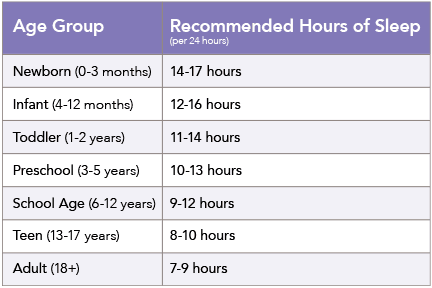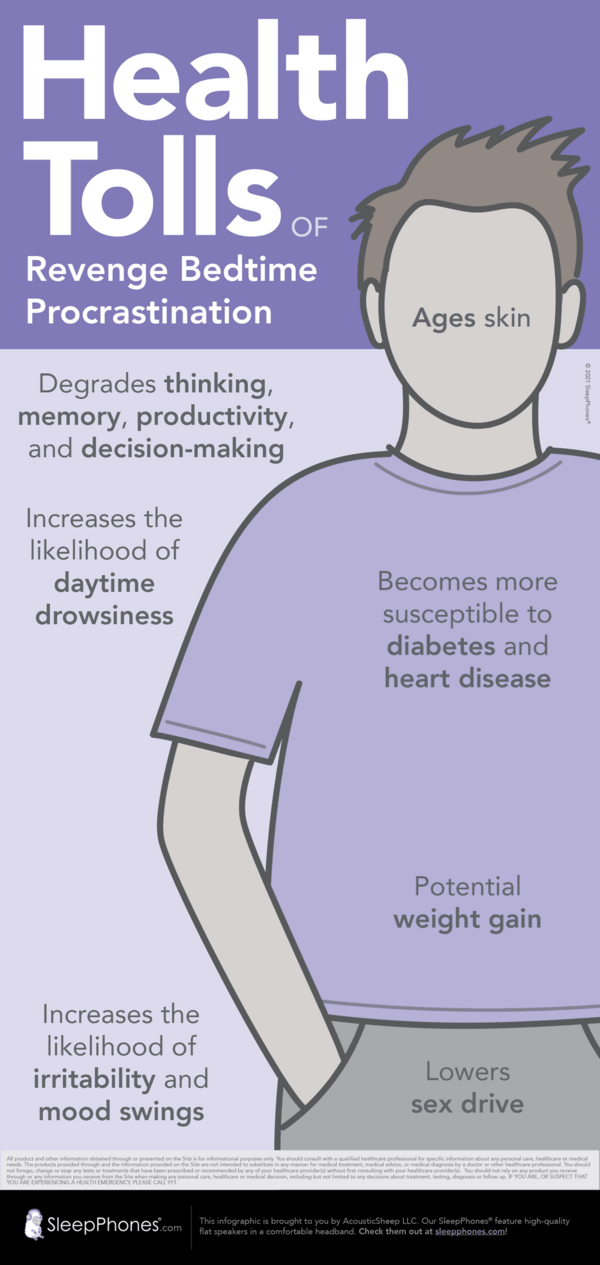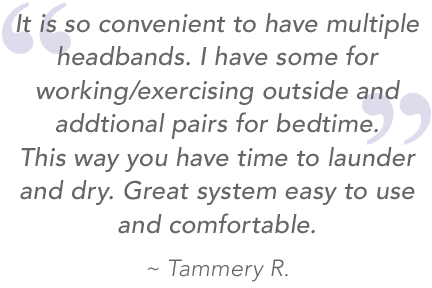Revenge Bedtime Procrastination: Late Night Personal Time Is Turning Into a Sleep Disorder

It's a fact: There are only so many hours in a day. And for many, our days are blocked off into chunks of work, sleep, and personal time. And when many of us feel the latter running short, we may try to borrow time from our sleep schedule. Sacrificing sleep on a regular basis that becomes a pattern has a name, and that name is Revenge Bedtime Procrastination (RBP).
It's typically noticed in overworked employees who attempt to reclaim time in their day by staying up late despite having to wake up early. As a result, they become sleep-deprived and experience regret but continue this sleepless cycle. While those who participate in revenge bedtime procrastination have successfully provided themselves with a few hours of entertainment following their busy work schedules, they are potentially causing a snowball effect of sleep complications.
Why Delay Sleeping?

Sleep barriers are divided into three categories: physical, mental, and emotional elements. According to the National Library of Medicine, the leading causes of sleep procrastination are a lack of self-regulatory resources, possessing an evening chronotype (experiencing late circadian rhythms), and daytime stress.
For those who participate in revenge bedtime procrastination, their sleep barriers are primarily mental elements. Because work often takes up most of the time in a day, employees are desperate for free time and will do anything to achieve it due to the stress accumulated throughout the workday, coupled with the pressures of maintaining and separating their work and personal life. For some, that means sacrificing necessary hours of sleep to scroll through a phone, read a book, finish a project, or watch a few hours of television.
Why not wait another day and get some sleep? People want to feel like they have power over their lives. If someone chooses to stay awake and divide time for their favorite hobby, they feel as if they are in control. By doing so, it—in theory—makes up for the time lost during the day. Often, the choice to stay awake results in dissatisfaction, feelings of guilt, and sleep deprivation.
A study found that bedtime procrastination is higher in young adults, students, and women. It is safe to assume that those findings have only increased due to the pandemic since the distinction between work and personal life has diminished. Working from home has taken an even larger toll on employees experiencing revenge bedtime procrastination. Additionally, if a person has poor self-regulation and has already made a habit of procrastinating, they may be more likely to experience revenge bedtime procrastination. However, it is important to note that these assumptions are not absolute. There have been many individuals who have actually managed to develop healthier sleep routines amid the pandemic.
Revenge Bedtime Procrastination’s Toll on Health

With bedtime sleep procrastination comes sleep deprivation. Lack of sleep can lead to the development of sleep disorders, in addition to mental, physical, and emotional complications. More importantly, lack of sleep negatively impacts the body’s immune system, which leads to an increased risk of falling ill.
Specifically, participating in revenge bedtime procrastination:
- Degrades thinking, memory, productivity, and decision-making
- Increases the likelihood of daytime drowsiness
- Increases the likelihood of irritability and mood swings
- Becomes more susceptible to diabetes and heart disease
- Potential weight gain
- Lowers sex drive
- Ages skin
Because sleep deprivation weakens the immune system, those exposed to SARS-CoV-2 while practicing unhealthy sleeping habits are much more likely to be diagnosed with the COVID-19 virus. Sara Makin, Founder & CEO of Makin Wellness, says that “the only positive with revenge sleep procrastination is that there’s a false appearance that you have more control over your life. This is very reinforcing and will entice you to continue this behavior, even though the risks outweigh the rewards.”
That being said, revenge bedtime procrastination has no real benefits. Instead, revenge bedtime procrastination provides a false sense of control that causes a plethora of health complications, and the more you do it, the worse it can become.
Time Management and Getting Better Sleep

Time management and self-regulation are two huge factors to consider when it comes to revenge bedtime procrastination. When beginning to make changes to your sleep schedule, first find out how much sleep you need per night. The Centers for Disease Control and Prevention (CDC) has determined that the amount of sleep you require changes based on your age group:

To get better sleep, our team at AcousticSheep™ recommends:
- Going to bed and waking up at the same time every day
- Preparing the bedroom for sleep (making the bed, adjusting the room temperature)
- Checking the quality of your mattress
- Getting your exercise in earlier in the day (at least three hours before bedtime)
- Watching what you eat and drink before bedtime
- Keeping stressors off your mind
- Using audio-based sleep therapy (like SleepPhones® headphones)
Developing a new bedtime routine to improve sleep quality can be difficult. To start, it is most beneficial to practice time management effectively as doing so will eliminate the desire to participate in revenge bedtime procrastination. Additionally, setting boundaries at work and predetermining your daily schedule may make room for more free time at home.

Practicing Better Sleep Hygiene with SleepPhones®
If you find that you are struggling to fall asleep at night, consider trying one of our many SleepPhones® products. SleepPhones® headphones help create a more peaceful sleeping environment by eliminating light, reducing ambient noise, and playing a wide variety of calming sounds. By practicing time management and making better choices during the day, you’ll no longer feel the need to take part in revenge bedtime procrastination!
"I ordered my first pair if these in February of 2017. I have used SleepPhones® in one form or another since then practically every single night. Customer service is awesome and this Christmas I finally got my husband ( who has been making fun of me for wearing them ) a pair of the wireless ones and guess who sleeps with them every night now? I prefer the fleece as it is so cozy and the wired ones but may soon make the jump to bluetooth. I love these and have several pairs. Always keep one in my travel bag!" - Tee M.

"It is so convenient to have multiple headbands. I have some for working / exercising outside and addtional pairs for bedtime. This way you have time to launder and dry. Great system easy to use and comfortable." - Tammery R.
"I have loved and appreciated my first set of wireless SleepPhones® so much I purchase a second pair. Because I live in a warm climate I purchased both in the breeze fabric. I have one connected to my iPhone that I use at bedtime for sleep and another I use for my iPad that I take to the gym to listen to music while I read ebooks on the treadmill. They are so easy to charge by just removing and putting on their own little charge station. No worries about wires. They are easy to wash and dry quickly so they dry on the same day to use again that night. They can be used with all kinds of Bluetooth® apps that make it possible to sleep through outside noises or a partner’s snoring sounds. They have made a huge difference in the quality of my sleep." - Patricia E.
* Please note that our content is not intended to substitute for medical advice, diagnosis, or treatment. We strongly advise that you see your physician or other qualified healthcare professional with any questions regarding a medical condition. Call 911 immediately if you have a medical emergency.
Find how to get more done at our "Productivity" resource page.
